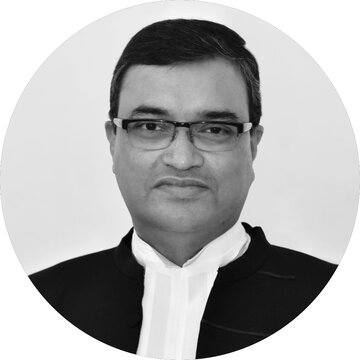Dipankar Datta

Dipankar Datta
Sitting Judge of the Supreme Court of India
Assumed Office12th Dec, 2022
Retires On8th Feb, 2030
Previously
Chief Justice of the Bombay High CourtApril 28th, 2020 - December 11th, 2022
Permanent Judge of the Calcutta High CourtJune 22nd, 2006 - April 27th, 2020
Junior Standing Counsel for the State of West BengalMay 16th, 2002 - January 16th, 2004
Profile
Early life and education
Justice Dipankar Datta was born on 9 February 1965. His father, late Justice Salil Kumar Datta, was a former judge of the Calcutta High Court. Justice Datta graduated in law in 1989 from Hazra Law College, University of Calcutta.
Career as an advocate
In 1989, Justice Datta enrolled as an advocate with the Bar Council of West Bengal and began his practice at the Calcutta High Court. In 1998, he was appointed as a Counsel for the Union of India. Subsequently, in 2002, he became a Junior Standing Counsel for the State of West Bengal. He was also a guest lecturer on Constitutional Law at the University College of Law, University of Calcutta between 1996-97 and 1999-2000.
Career as a judge
After an extensive practice spanning 16 years, in 2006, Justice Datta was appointed as a permanent judge of the Calcutta High Court. His tenure in the Calcutta High Court lasted nearly 14 years before he was elevated as the Chief Justice of the Bombay High Court in April 2020. Reportedly, he drove 2000 km from Kolkata to Mumbai during the COVID-19 lockdown as rail and air services were suspended.
On 26 September 2022, Justice Datta was recommended as a judge of the Supreme Court by the Collegium led by former Chief Justice of India U.U Lalit. The recommendation came during a time when there was a rift between the Supreme Court and the Union Law Ministry. Notably, Justice Datta’s recommendation had not been confirmed for two months until his appointment on 12 December 2022. He is expected to serve as judge for 8 years and will retire in February 2030.
Justice Datta has authored 39 judgements and has been part of 198 benches.
The majority of judgements authored by Justice Datta are in criminal matters (32%), followed by service (27%), civil (14%), property (7%), electricity (4.5%), and other matters (16%).
Notable judgements
As a judge of the Supreme Court
In Aligarh Muslim University Through its Registrar Faizan Mustafa v Naresh Agarwal (2024), a seven-judge Constitution Bench by a 4:3 majority overruled Azeez Basha v Union of India (1967). The bench laid down criteria for identifying minority educational institutions under Article 30. The question of Aligarh Muslim University’s (AMU) minority status was left to a smaller bench to decide based on these parameters.
Justice Datta authored a dissenting opinion in the case. He held that minority rights could not be retroactively applied to pre-Constitution institutions. Disagreeing with CJI Chandrachud’s view that “establishment” alone could determine minority status, he found such reasoning contradictory when applied to AMU. While suggesting the majority’s test may favour AMU, he accepted the Union’s argument that the Muslim community had not intended to administer the university and thus AMU had relinquished its minority character under the Aligarh Muslim University Act, 1920.
In Association for Democratic Reforms v Election Commission of India (2024), a Division Bench of Justices Sanjiv Khanna and Datta unanimously rejected a petition by the Association for Democratic Reforms (ADR) seeking 100% Voter Verified Paper Audit Trail verification of Electronic Voting Machine votes. Justice Datta, in his separate opinion, agreed that a ballot paper for voting cannot be restored to replace the existing EVM-VVPAT system. He found the EVM-VVPAT system “distinctly more satisfactory,” noting that the seven-second display of the VVPAT slip provides the voter visual confirmation. This, he concluded, better fulfils the voter’s right under Article 19(1)(a) to know that their vote has been recorded.
As a judge of the High Court
In Nilesh Navalakha v Union of India (2020), a three judge bench of the Bombay High Court, led by Chief Justice Datta, criticised the role of the media in reporting the Sushant Singh Rajput case. They stated that the media should not attempt to interfere with a fair investigation and negatively affect the presumption of innocence. The bench called for media agencies to differentiate between ‘media trials’ and ‘informative media’ in reporting cases.
In Agij Promotion of Nineteenonea Media Pvt. Ltd. v Union of India (2021) Chief Justice Datta and Justice G.S. Kulkarni heard a petition challenging the constitutional validity of the IT Rules 9(1) and 9(3). Rule 9(1) compelled media organisations to adhere to a Code of Ethics. Rule 9(3) allowed anyone to complain against these organisations if the Code of Ethics were breached. The Bench stayed Rules 9(1) and 9(3) stating that it requires publishers to follow other legislations that do not have any relation to the Information Technology (Intermediary Guidelines and Digital Media Ethics Code) Rules, 2021 or the Information Technology Act, 2000.
In High Court on its own motion v Bhiwandi Nizampur Municipal Corpn (2022), the Bombay High Court Court, heard a public interest petition in the Jilani Building Collapse case. The collapse claimed 40 lives. Chief Justice Dipankar Datta and Justice G.S. Kulkarni passed Orders directing the Municipal Corporations in Mumbai to repair broken structures and buildings to avoid mishaps. The Division Bench also observed that the current housing conditions of Mumbai slums are in dire need of change.
In Shree Atma Kamal Labdhisurishwarji Jain Gyanrnandir Trust v Union of India, Chief Justice Datta directed Jain religious institutions to withdraw a Public Interest Litigation that sought to ban advertisements of non-vegetarian food. Justice Datta stated that such a ban could violate and encroach on other people’s rights and that the High Court was not empowered to impose such a ban.